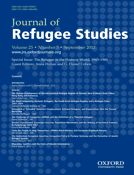
Journal of Refugee Studies
Scope & Guideline
Exploring the intricate dynamics of refugee experiences.
Introduction
Aims and Scopes
- Interdisciplinary Research on Refugee Issues:
The journal emphasizes a transdisciplinary approach, drawing from sociology, law, public health, and cultural studies to understand the multifaceted nature of refugee experiences. - Focus on Policy and Legal Frameworks:
A significant aim of the journal is to analyze the legal and policy contexts surrounding refugees, exploring how these frameworks affect their rights, protections, and integration. - Exploration of Refugee Experiences and Agency:
The journal seeks to highlight the voices and experiences of refugees themselves, focusing on their coping mechanisms, resilience, and agency in navigating displacement. - Impact of Social and Economic Factors:
Research published in the journal often examines the socio-economic conditions influencing refugees, including barriers to self-reliance, employment, and education. - Cultural and Identity Studies:
The journal also engages with cultural narratives and identity constructions among refugees, exploring how these factors shape their experiences of belonging and displacement.
Trending and Emerging
- Intersectionality and Diverse Identities:
An increasing number of papers focus on the intersectionality of refugee identities, particularly examining how factors like gender, sexual orientation, and ethnicity shape experiences of displacement and integration. - Mental Health and Wellbeing of Refugees:
There is a growing emphasis on mental health issues among refugees, including studies that explore trauma, resilience, and coping strategies, highlighting the psychological dimensions of forced migration. - Transnationalism and Belonging:
Emerging research focuses on transnational connections and the concept of belonging, analyzing how refugees maintain ties to their home countries while integrating into host societies. - Refugee Participation and Agency:
There is a notable trend towards exploring the agency of refugees in policymaking and community building, with studies advocating for participatory approaches in addressing refugee issues. - Impact of Climate Change on Displacement:
Recent publications increasingly address the intersections between climate change and forced migration, examining how environmental factors contribute to displacement and the vulnerabilities faced by affected populations.
Declining or Waning
- Traditional Humanitarian Approaches:
There has been a noticeable decrease in papers focusing solely on traditional humanitarian responses, such as basic needs provision, suggesting a shift towards more complex analyses of refugee agency and structural issues. - Homogenized Narratives of Refugees:
Research that presents refugees as a monolithic group, without attention to diverse experiences based on gender, sexual orientation, and socio-economic background, is becoming less common, reflecting a broader recognition of intersectionality. - Focus on Short-Term Crisis Responses:
The journal has moved away from studies that solely address immediate crisis responses, favoring long-term solutions and the integration processes of refugees within host societies. - Legalistic Perspectives on Refugee Status:
There appears to be a waning interest in purely legalistic analyses of refugee status determination processes, as the field increasingly emphasizes lived experiences and socio-political contexts.
Similar Journals
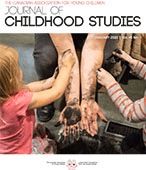
Journal of Childhood Studies
Illuminating Childhood Through Multidisciplinary ResearchJournal of Childhood Studies, published by University of Victoria, is an eminent peer-reviewed journal dedicated to the comprehensive exploration of various aspects of childhood and child development. With an ISSN of 2371-4107 and E-ISSN 2371-4115, this open access journal has been providing a platform for scholarly discourse since its inception in 2016. The journal embraces a multidisciplinary approach, inviting contributions from diverse fields such as psychology, education, sociology, and public health, ensuring a rich tapestry of research that informs policy and practice. With its commitment to high-quality and accessible research, the Journal of Childhood Studies aims to foster a deeper understanding of children's experiences and well-being in contemporary society. Given its significance in the field, this journal is a vital resource for researchers, professionals, and students who are dedicated to advancing knowledge and advocating for the rights of children globally.
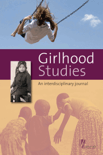
Girlhood Studies-An Interdisciplinary Journal
Challenging Perspectives on the Journey of GirlhoodGirlhood Studies - An Interdisciplinary Journal, published by BERGHAHN JOURNALS, is a vital scholarly platform dedicated to exploring the complexities of girlhood through a multidisciplinary lens. The journal, which spans a significant convergence of years from 2015 to 2024, delves into critical themes related to girlhood as they intersect within the fields of Gender Studies, Education, Developmental and Educational Psychology, and Social Psychology, among others. With its focus on fostering rigorous research, the journal serves as a crucial resource for academics and practitioners interested in the sociocultural dynamics affecting girls globally. Although currently not Open Access, it maintains a noteworthy presence in academia, achieving Q3 and Q2 ranks in multiple categories as of 2023. Leveraging its position, Girlhood Studies promotes thought-provoking discussions and analysis, making it essential reading for those looking to contribute to the dialogue surrounding the development and representation of girls in society.

Refuge
Connecting scholars and practitioners for impactful dialogue.Refuge is a prominent open-access journal dedicated to the ever-evolving field of refugee studies, published by the Center for Refugee Studies at York University, Canada. Since its establishment in 1981, this journal has become a vital platform for scholars, practitioners, and students to disseminate and engage with research on refugee issues, encompassing cultural, social, and political dimensions. With a prolific history of publication covering significant periods from 1996 to 2024, Refuge has solidified its influence within multiple disciplines, being recognized in the Q1 category of Cultural Studies and achieving respectable rankings in Demography, Geography, Planning and Development, as well as Political Science and International Relations. These accolades, along with its strong commitment to open access, enhance the journal's accessibility and relevance in addressing global refugee crises. Researchers and professionals alike will find Refuge an essential resource for informed dialogue and innovative solutions in of one of the most pressing humanitarian challenges of our time.
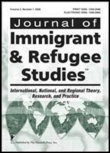
Journal of Immigrant & Refugee Studies
Transforming Perspectives on Refugees and ImmigrantsJournal of Immigrant & Refugee Studies, published by ROUTLEDGE JOURNALS, TAYLOR & FRANCIS LTD, serves as a leading platform for scholarly exploration within the domains of demography, geography, and health social sciences, particularly focusing on the pivotal issues surrounding immigration and refugee experiences. With an impressive impact factor reflecting its significant contribution to the field, this journal offers invaluable insights and research findings, ranked in the Q2 Quartiles across multiple categories, including Demography and Geography, Planning and Development. Researchers, professionals, and students are encouraged to engage with the journal's expansive coverage, which spans from 2006 to 2024, ensuring a contemporary understanding of the evolving dynamics of migration. Although currently not open access, the journal's rigorous peer-reviewed articles facilitate a comprehensive dialogue on critical challenges and opportunities faced by immigrant and refugee populations, making it an essential resource for advancing knowledge and policy in this crucial area of study.

Insight Turkey
Exploring the Dynamics of Politics and Society in TurkeyInsight Turkey is a leading academic journal published by the SETA Foundation, focusing on pivotal issues within the realms of Political Science and International Relations. By offering a platform for scholarly discussion, the journal provides critical analyses and informed perspectives on socio-political dynamics in Turkey and beyond, making it essential reading for researchers, professionals, and students alike. With an ISSN of 1302-177X and an E-ISSN also of 1302-177X, Insight Turkey is recognized within academic circles, reflected by its positioning in the Q3 quartile for both Political Science and Sociology by 2023 rankings. This journal not only contributes significantly to its fields, ranking #463 out of 706 in Political Science and #981 out of 1466 in Sociology, but it also engages with contemporary issues critically and cross-disciplinarily. Although it currently does not offer open access, Insight Turkey remains a valuable resource for those invested in understanding the complexities of political landscapes and social phenomena, with publications running from 2009 to 2024. For academics looking to deepen their insights and engage with emerging research, Insight Turkey is an indispensable asset.
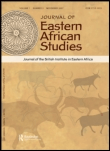
Journal of Eastern African Studies
Unveiling Insights into Eastern African Cultures and PoliticsJournal of Eastern African Studies, an esteemed publication within the field of anthropology, cultural studies, history, and political science, is published by Routledge Journals, Taylor & Francis Ltd from its base in the United Kingdom. With an impressive impact factor reflected by its Q1 ranking in multiple categories—including anthropology, cultural studies, and history—this journal stands as a critical resource for scholars and professionals interested in understanding the complexities of Eastern Africa. Since its inception in 2009, the journal has explored diverse themes pertinent to the region's socio-political landscape, indigenous cultures, and historical trajectories, while contributing significantly to ongoing academic discourse. Although currently not an open-access journal, its commitment to high-quality scholarship and its accessibility through major academic databases underscore its importance in advancing research and fostering deeper insights into Eastern African Studies. The journal's rigorous peer-review process ensures that only the most relevant and impactful research is disseminated, solidifying its position as a leading outlet in the field.
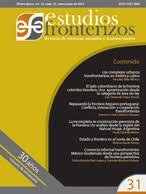
Estudios Fronterizos
Bridging Disciplines to Illuminate Border StudiesEstudios Fronterizos is a prestigious academic journal published by the Universidad Autónoma de Baja California, renowned for its contributions to interdisciplinary studies concerning border issues, with a focus on the social sciences, including Anthropology, History, Demography, and Political Science. Since its inception in 1983, this Open Access journal has fostered academic dialogue by providing an accessible platform for researchers, professionals, and students to share their findings and insights. With its impressive impact factor and recognition as a Q1 and Q2 journal across various disciplines as of 2023, Estudios Fronterizos not only serves as a crucial resource for contemporary research on border dynamics but also stands out in comparisons to its peers—ranked within the top percentiles in several categories such as Arts and Humanities, Social Sciences, and Demography according to Scopus. The journal's expanding scope and commitment to academic rigor ensure its role as a foundational resource for those seeking to understand the complexities of border studies in a globalized world.

Nordic Journal of Migration Research
Navigating the Intersection of Migration and SocietyThe Nordic Journal of Migration Research, published by HELSINKI UNIV PRESS, is a leading interdisciplinary open-access journal that has been contributing to the field of migration studies since its inception in 2011. With the ISSN 1799-649X, it provides a valuable platform for researchers, professionals, and students interested in exploring the complex dynamics of migration within the Nordic context and beyond. The journal holds a distinguished position in several categories, proudly achieving a Q2 ranking in fields such as Anthropology, Demography, Law, Sociology and Political Science, and Geography, Planning and Development as of 2023. These rankings highlight its significance and impact, particularly as it appeals to a diverse audience interested in the social, cultural, and legal aspects of migration. With its continuous publication through converged years from 2019 to 2024, the journal remains a crucial resource for advancing knowledge and fostering scholarly discourse in an era marked by global migration challenges. Located in Helsinki, Finland, the journal can be accessed freely, promoting wide dissemination of research findings that inform policy and practice.
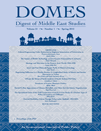
Digest of Middle East Studies
Engaging Minds in the Study of Middle Eastern NarrativesDigest of Middle East Studies (ISSN: 1060-4367; E-ISSN: 1949-3606), published by WILEY, is an esteemed academic journal dedicated to the exploration and dissemination of research in the complex and multifaceted domains of Middle Eastern studies. Since its inception in 1992, the journal has provided a vital platform for scholarly discourse, addressing critical themes in cultural studies, history, law, politics, and religious studies, making it a cornerstone for researchers, professionals, and students alike. Notably, the journal's respected ranking in various Scopus categories, including Q1 in History and Religious Studies, highlights its significance and impact within these fields. While not an open-access journal, it remains an essential resource for in-depth analysis and innovative insights, contributing to a greater understanding of the socio-political and cultural dynamics of the Middle East. The journal's ongoing commitment to academic excellence assures its relevance through 2024 and beyond, fostering a robust engagement with contemporary issues and historical narratives.

Journal of International Migration and Integration
Transforming Perspectives on Global Migration IssuesJournal of International Migration and Integration, published by Springer Heidelberg, is a prestigious scholarly journal that serves as a vital platform for advancing the field of migration studies. With a focus on the interdisciplinary dialogue among anthropology, cultural studies, and demography, this journal has achieved remarkable recognition, exemplified by its Q1 status in Anthropology and Cultural Studies, as well as its Q2 designation in Demography. With its ISSN 1488-3473 and E-ISSN 1874-6365, the journal provides exceptional insights into migration-related issues and integration processes across diverse global contexts. As of 2023, the journal ranks in the 91st percentile in Cultural Studies, the 83rd percentile in Anthropology, and the 71st percentile in Demography on Scopus, reflecting its significant impact on scholarly discourse. Researchers, professionals, and students engaged in the study of migration will find this journal an indispensable resource for contemporary research and innovative solutions in understanding the complexities of migration and integration.